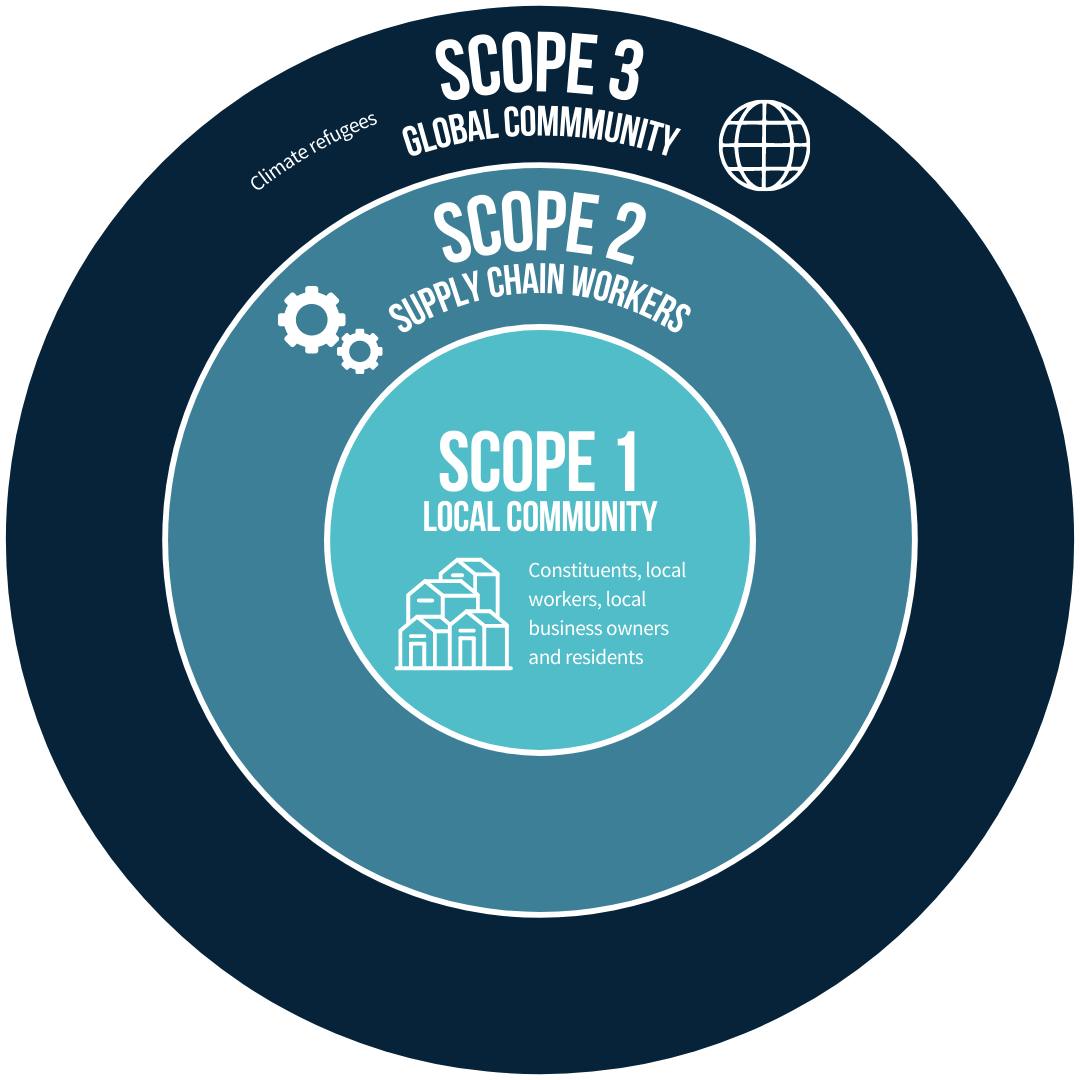Equity & Inclusion on the path to net zero
What is an inclusive transition to a net zero world?
A just transition to a net zero future needs to be inclusive, not just of a range of actors and their priorities, but also of a range of views, including in particular those relating to moral and ethical arguments on climate justice. Please follow this page as a work in progress, with latest updates in research and applied practices for increasing equity and inclusion in the net zero transition.
Framing Emissions Responsibilities
The central and enduring questions in contemporary climate policy are how the burden for reducing emissions should be shared, specifically who should bear responsibility for reducing emissions, by how much and when. Different approaches to global emissions produce different answers to these questions:
Historical vs.
Contemporary Emissions
- Emissions and economic development. In an equitable world, each country would have a share of possible global emissions proportional to their population to develop at an equal rate to other nations. This has not happened, leading to economic inequality across the world.
- Developed countries have historically emitted a larger share of emissions, allowing them to develop at a greater rate. While developing countries have begun to rapidly increase their emissions, historical emissions of developed nations far outweigh these increases.
- Time matters. Efforts to reduce emissions now are essential, but obfuscating the reality of historical emissions exacerbates the reality of global economic inequality. Including the costs of adaptation (along with emissions reductions) within the responsibility of developed countries helps establish a just accounting of historical emissions.
Luxury vs.
Survival Emissions
- Survival emissions: emissions necessary for the pursuit of subsistence and the activities required to live a healthy life.
- Luxury emissions: emissions generated from non-essential activities, such as driving high-emitting cars or frequently flying.
- In an equitable transition to net zero, luxury emissions would be tackled first, so that survival emissions make up the remaining share of ongoing emissions in a low-carbon world. This would allow poorer regions to develop, while also ensuring that luxury emissions are decarbonised among the wealthy classes across the world. To read more on this framing see Shue, 1993.
Though China currently emits more CO2 than any other nation in the world (around 27% of global emissions in 2017), the United States is responsible for 25% of global cumulative emissions, twice the amount of China’s historical emissions share.

StakeholderS to Consider
As Part of Any Net Zero Strategy
Climate change affects communities on every level, and net zero strategies should, too. It is critical to consider how a given net zero strategy will affect local, extended, and global communities. This diagram (a working idea) offers a framework for net zero committers to think through the different scopes of stakeholder groups which they will need to consider as part of their net zero strategy (in addition to the emissions scopes which they will be required to cover as part of their GHG accounting process). [Oxford Net Zero research paper forthcoming.]
Equity concerns on the pathway to net zero
DIsplacement and exclusion of indigenous communities
While the rapid development of global renewable infrastructure is necessary for achieving net zero, it has raised concerns relating to community displacement. There are a growing number of examples of the displacement of indigenous communities as a result of “green development” projects, particularly in South Asia and Africa.
The exclusion of indigenous knowledge and perspectives has also been witnessed in a number of carbon offsetting ventures. Quick carbon sequestration solutions that fail to consult indigenous communities or environmental experts (such as monoculture plantations) weaken biodiversity and lead to unintended psychological, social and economic consequences on local communities.
ENvironmental racism
Climate justice intersects with other major systems of inequality and injustice in our world, including global racism. Access to environmental resources, environmental health outcomes, and experiences of environmental change are all affected by one’s identity. “Environmental racism” exists within pathways to global net zero when indigenous peoples and people in the Global South are forced from their communities in the name of a crisis for which they are largely not responsible.
Unequal Effects
Negative impacts of the climate crisis have been shown to disproportionately affect developing countries, indigenous communities, people of colour, and women. Vulnerable populations overall are expected to suffer more severe consequences and sooner than those with greater access to resources.
Developing countries
The greatest degree of warming is projected to be in developing countries located in the Global South, but such countries generally have poorer infrastructure, and less capacity to adapt and cope with the effects due to their limited economic capabilities than their northern counterparts.
Indigenous communities
Rising sea levels and changing marine ecosystems have been shown to highly affect indigenous communities in both coastal and mountainous locations. As much as 80% of the world’s remaining forest biodiversity lies within indigenous peoples’ territories, and indigenous and community lands store at least 24% of the above-ground carbon in the world’s tropical forests.
Racial Inequality
Decades of unjust, racist environmental policies have seen some communities of colour become dumping ground for toxic chemicals. In the US, air pollution disproportionately harms individuals of colour, with more than 57% of people of color living in counties with a failing grade for air quality measures (compared to 37% of whites).
Gender Inequality
Women are more likely to be negatively affected by the climate crisis than men. More likely to live in extreme poverty than men, women have lower access to basic human rights and resources, making adaptation to changing environmental conditions more difficult. Women also deal with systemic systems of gendered violence, which are often exacerbated by instability, such climate-induced migration.
Other research themes
Greenhouse gas removal
There are various types of Greenhouse Gas Removal (GGR) technologies which recapture already emitted greenhouse gases from the atmosphere and ocean.
Nature-based Solutions
Nature-based Solutions (NbS) involve working with and enhancing nature to achieve multiple benefits for people, including removing CO2 from the air, and aiding adaptation to climate change.
Green Recovery and Resilience
A green recovery from COVID-19 could accelerate GDP growth in the immediate future, establish new industries and jobs for the coming decade, and deliver a sustainable climate for the next century.
News and Events

Oxford Net Zero: The story so far
Oxford Net Zero is excited to share a new summary of its work. Oxford Net Zero: The story so far gives a representative look at our work over the life of the programme since its inception, organised around three key areas: An integrated ... Read more

UK Government Voluntary Carbon and Nature Markets policy consolidates action on nature and climate, but risks compromising urgent mitigation of climate change and preventing and repairing nature loss, say ONZ researchers
Oxford, 23 June 2025 Researchers from the Leverhulme Centre for Nature Recovery, Oxford Net Zero and Oxford Sustainable Finance Group have submitted feedback to the UK Government’s ‘Voluntary Carbon and Nature Markets: Raising Integrity’ ... Read more

Job opening: Serviced Emissions Research & Engagement Manager
The Oxford Net Zero Engagement Team is recruiting for a Serviced Emissions Research & Engagement Manager. This pivotal role will lead a high-impact initiative focused on advancing the understanding and integration of “serviced emissions” ... Read more

New Oxford Report: Carbon Capture and Storage Without Taxpayer Billions Is Possible
Oxford Net Zero and Carbon Balance researchers reveal the risks of the current UK CCS policy mix and explore how a carbon storage mandate on fossil fuel producers could help the UK meet its climate targets while protecting public finances A ... Read more

Oxford Net Zero partners with AXA XL on research in India, Mexico and Kenya
Oxford Net Zero is excited to announce that it is working with the insurance company AXA XL, the Institute for Science, Innovation and Society (InSIS), and the Smith School of Enterprise and the Environment to conduct research on private sector ... Read more

Finance, Fossil Fuels and $10 coffee: Reflections on COP29
As we begin a new year, Oxford Net Zero looks back on the highs and lows of November's climate summit in Baku. In some ways, this COP was different. The venue was smaller than in previous years, which meant that attendees could have genuine ... Read more
See more news and events